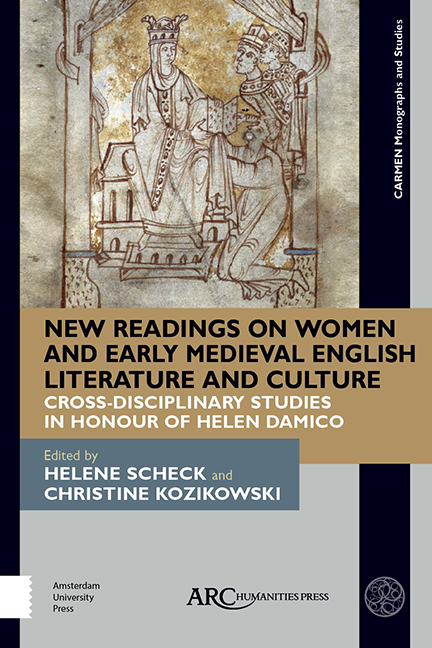 New Readings on Women and Early Medieval English Literature and Culture
New Readings on Women and Early Medieval English Literature and Culture Book contents
- Frontmatter
- Contents
- List of Illustrations
- List of Abbreviations
- Note from the Editors
- Introduction: Feminism and Early English Studies Now
- PART ONE LITERACY AND MATERIAL CULTURE
- PART TWO ENGENDERING MARRIAGE AND FAMILY
- PART THREE WOMEN OF THE BEOWULF MANUSCRIPT
- PART FOUR WOMEN AND ANGLO-SAXON STUDIES
- Select Bibliography
- Index of Manuscripts
- General Index
10 - Boundaries Embodied: An Ecofeminist Reading of the Old English Judith
Published online by Cambridge University Press: 20 November 2020
- Frontmatter
- Contents
- List of Illustrations
- List of Abbreviations
- Note from the Editors
- Introduction: Feminism and Early English Studies Now
- PART ONE LITERACY AND MATERIAL CULTURE
- PART TWO ENGENDERING MARRIAGE AND FAMILY
- PART THREE WOMEN OF THE BEOWULF MANUSCRIPT
- PART FOUR WOMEN AND ANGLO-SAXON STUDIES
- Select Bibliography
- Index of Manuscripts
- General Index
Summary
AN ECOFEMINIST READING of the Old English adaptation of the biblical Book of Judith yields new insights into the poem. The narrative seems an unlikely site for attention to environmental issues, as it concerns a city and an enemy encampment, with little description of landscape of any kind, urban or rural. As a victorious leader for her people, Judith seems an improbable subject for the kind of ecofeminist analysis done by Val Plumwood, who notes a consistent identification of the feminine with the natural world in opposition to the presumed norms of masculine rationality. But the text is suffused throughout with boundaries breached and violated— geographical, gendered, temporal, and religious divides, as well as divisions between humans, animals, and objects, drunk and sober, alive and dead. Judith crosses geographical boundaries and exists in a liminal space at the margins of gender and religion, a nuanced figure whose heroic stature engenders slippage in the terms of the narrative.
Geographical Boundaries
The biblical Book of Judith describes the terrain around the Hebrew city of Bethulia as a mountainous wilderness, with the city itself located high in the hills; the Assyrians must traverse remote and threatening mountain passes in order to reach the city (see in particular chapters 5, 6, 7, and 13). The Old English poetic rendition, as it survives in the Beowulf manuscript, opens in mid-sentence with material corresponding to chapter 13 of the biblical book, with an unknown quantity of the poem now lost. Scholars have argued that the poem is almost complete as it stands and, conversely, that the entire biblical text was once represented in Old English verse and only a fragment remains; Peter Lucas has surveyed the arguments on both sides. Within portions of the biblical text that correspond to what survives of the poem, there are several references to hilly terrain that are not represented in the poem. After Judith and her servant leave the Assyrian camp to return to the city, for instance, the Vulgate has “gyrantes vallem venerunt ad portam civitatis” (went around the valley to the gate of the city, 13.12).
- Type
- Chapter
- Information
- New Readings on Women and Early Medieval English Literature and CultureCross-Disciplinary Studies in Honour of Helen Damico, pp. 179 - 190Publisher: Amsterdam University PressPrint publication year: 2019


